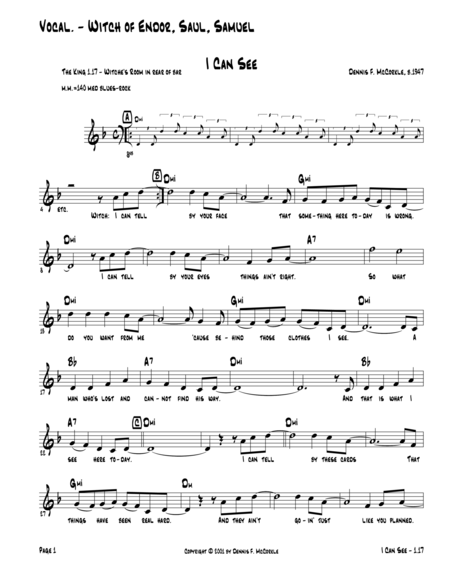Alto Voice,Vocal Solo - Level 3 - Digital Download SKU: A0.784838 Composed by McCorkle, Dennis F. Broadway,Christian,Jewish,Musical/Show,Rock. 28 pages. DF McCorkle Music and eBook Publications #11767. Published by DF McCorkle Music and eBook Publications (A0.784838). CUT FROM SHOW: I Can See. The King, by Dennis McCorkle, is a contemporary pop-rock musical of the first two kings of Israel, Saul ben Kish and David ben Jesse and explores the contrasting lives and outcome of each manâs choices in life. [1 Samuel 28:7-18 - Then said Saul unto his servants, Seek me a woman that hath a familiar spirit, that I may go to her, and inquire of her. And his servants said to him, Behold, there is a woman that hath a familiar spirit at Endor. And Saul disguised himself, and put on other raiment, and he went, and two men with him, and they came to the woman by night: and he said, I pray thee, divine unto me by the familiar spirit, and bring me him up, whom I shall name unto thee. And the woman said unto him, Behold, thou knowest what Saul hath done, how he hath cut off those that have familiar spirits, and the wizards, out of the land: wherefore then layest thou a snare for my life, to cause me to die? And Saul sware to her by Yahweh, saying, As Yahweh liveth, there shall no punishment happen to thee for this thing. Then said the woman, Whom shall I bring up unto thee? And he said, Bring me up Samuel. And when the woman saw Samuel, she cried with a loud voice: and the woman spake to Saul, saying, Why hast thou deceived me? for thou art Saul. And the king said unto her, Be not afraid: for what sawest thou? And the woman said unto Saul, I saw gods ascending out of the earth. And he said unto her, What form is he of? And she said, An old man cometh up; and he is covered with a mantle. And Saul perceived that it was Samuel, and he stooped with his face to the ground, and bowed himself. And Samuel said to Saul, Why hast thou disquieted me, to bring me up? And Saul answered, I am sore distressed; for the Philistines make war against me, and God is departed from me, and answereth me no more, neither by prophets, nor by dreams: therefore I have called thee, that thou mayest make known unto me what I shall do. Then said Samuel, Wherefore then dost thou ask of me, seeing Yahweh is departed from thee, and is become thine enemy? And Yahweh hath done to him, as he spake by me: for Yahweh hath rent the kingdom out of thine hand, and given it to thy neighbor, even to David: Because thou obeyedst not the voice of Yahweh, nor executedst his fierce wrath upon Amalek, therefore hath Yahweh done this thing unto thee this day. Also included with your order is our new 20 page catalog of over 150 titles at no additional charge.
